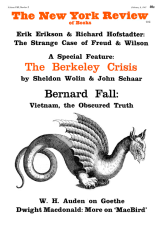In response to:
Nabokov's Way from the November 3, 1966 issue
To the Editors:
D.J. Enright [Nov. 3, 1966] seems to think that he has discovered the perversity in Lolita, for he speaks of
the (let’s face it) thoroughly squalid Odyssey through the perils and discomforts of American motels of Humbert and his Dutch wife.
But there is, in fact, no attempt in Lolita to make Humbert’s actions out to be anything but squalid. Nabokov’s success lay in maintaining a total artistic absorption in his character, without ever sentimentally excusing his acts. As a result, what Humbert does is despicable: what he is is fascinating. But the moralist insists that we not only punish but also revile the criminal. Furthermore, guilt must be complete:
since [Humbert] takes Lolita against her will, by threatening her with incarceration in a reformatory, morally (if one may be allowed to use that word just once) he is not strikingly superior to a rapist.
Using a simple-minded conception of guilt, Enright thinks that he must prove Humbert the seducer of Lolita. The moral (only a prude finds it necessary to apologize for using the word) is that though Humbert is telling the truth when he says that Lolita seduced him, this in no way excuses him. Even Humbert understands this point, which goes to prove that a pervert may have a surer sense of right and wrong than a moralist.
On the other hand, the prude may be more vulgar than the pervert. Humbert, when he describes his vile desires, is poetic, as Enright complains; when Enright describes Lolita, however, he calls it a “masturbatory epic,” and Lolita “a Dutch wife.” It is Enright who vulgarly sums up Nabokov’s works as “like farting Annie Laurie through a keyhole. It may be clever but is it worth the trouble?”
Enright’s simple-minded moralism and sniggering tone are accompanied by an equally crude but much more serious attempt to identify Nabokov with his crippled protagonists. He tells us that in Despair the mad “Hermann’s smugness is foreshadowed in the self-satisfaction of the foreword”; similarly, Humbert’s taste for nymphets, as Enright develops it, is foreshadowed in Nabokov’s autobiography in Nabokov himself.
Enright’s review is an indirect but nevertheless thoroughgoing personal and literary attack in which Nabokov is “poor in what is given to most men,” “arch,” “smug,” “self-satisfied,” and “haughty.” The implication, furthermore, is that his works reflect this character in being “distasteful, arch, affected, and perverse”:
As satire Lolita is scarcely more caustic than A Modest Proposal would be if it were known that its author indulged a taste for fricasseed infant.
Here Enright brings together his vulgarity and his confusion between life and art to make an again indirect but unmistakable slur on Nabokov’s character.
It would be difficult to find a more egregious example of bad taste, illogic, and literal-mindness than this review. Not only must Humbert be unequivocally a villain, but his prose style must also be attacked. A book with a mad character cannot be taken seriously:
Waltz [in The Waltz Invention] is loony—which makes hay of the publisher’s claim for the work’s prophetic qualities.
Enright is taken in by reading literally Nabokov’s announcement in a recent forward that: “Despair, in kinship with the rest of my books, has no social comment to make, no message to bring in its teeth.” Stanley Edgar Hyman’s comment on this in his piece on Despair was, “So, we translate, the book has a social message”—which it of course does, as Hyman went on to demonstrate.
Throughout the review Enright makes Vladimir Nabokov’s works out to be meaningless, merely esthetic, and “tricksy,” yet, at the same time, immoral. The contradiction in Nabokov’s being at once insignificant and sinister results, one has to conclude, from an identification in Enright’s mind between high art and immorality. The confusion is common enough, but it is surprising to run into it in the NYR.
If a reviewer could just once show us how he himself had been corrupted by a book, the charge of immorality might be made to stick. Enright almost accomplishes this when he quotes Page Stegner on Humbert’s “disgust for the American teen-ager” and comments on the phrase in an aside: “oh dear, one begins to see innuendos everywhere!” No doubt the innuendo in the eye of the beholder was sufficiently nasty; yet, the reluctance to communicate it leaves it at the un-Nabokovian level of obscenity. This is still not conclusive evidence.
Peter Shaw
New York City
This Issue
February 9, 1967



